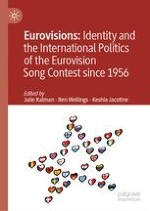2019 | OriginalPaper | Chapter
10. Europe: Start Voting Now! Democracy, Participation and Diversity in the Eurovision Song Contest
Author : Anika Gauja
Published in: Eurovisions: Identity and the International Politics of the Eurovision Song Contest since 1956
Publisher: Springer Nature Singapore
Activate our intelligent search to find suitable subject content or patents.
Select sections of text to find matching patents with Artificial Intelligence. powered by
Select sections of text to find additional relevant content using AI-assisted search. powered by
